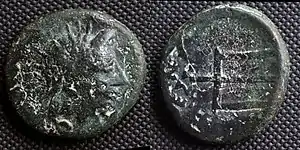Strymon (mythology)
In Greek mythology, Strymon (Ancient Greek: Στρυμών [stryˈmɔːn]), son of Oceanus and Tethys, was a river god[1] and king of Thrace.[2] By the muses Euterpe or Calliope, he became the father of Rhesus,[3][4] and possibly of Olynthus[5] and Brangas[2] and by Neaera of Evadne.[6] Strymon was also the father of Tereine who mothered Thrassa by the god Ares.[7] Another daughter, Rhodope became the mother of Athos by Poseidon.[8]

O: head of river-god Strymon
R: trident
This coin was struck by Serdi tribe in 187-168 BC or later. It's an overstrike on official Macedonian coin and imitates another Macedonian type.
For the river, see Strymon/Struma
Notes
- Hesiod, Theogony 339
- Conon, Narrations, 4
- Pseudo-Apollodorus, Bibliotheca 1.3.4
- Euripides, Rhesus 347
- Stephanus of Byzantium, Ethnica s.v. Olynthus
- Pseudo-Apollodorus, Bibliotheca 2.1.2
- Antoninus Liberalis. Metamorphosis, 21
- Scholia on Theocritus, Idyll 7. 76
References
- Antoninus Liberalis, The Metamorphoses of Antoninus Liberalis translated by Francis Celoria (Routledge 1992). Online version at the Topos Text Project.
- Conon, Fifty Narrations, surviving as one-paragraph summaries in the Bibliotheca (Library) of Photius, Patriarch of Constantinople translated from the Greek by Brady Kiesling. Online version at the Topos Text Project.
- Euripides, The Rhesus of Euripides translated into English rhyming verse with explanatory notes by Gilbert Murray, LL.D., D.Litt., F.B.A., Regius Professor of Greek in the University of Oxford. Euripides. Gilbert Murray. New York. Oxford University Press. 1913. Online version at the Perseus Digital Library.
- Euripides, Euripidis Fabulae. vol. 3. Gilbert Murray. Oxford. Clarendon Press, Oxford. 1913. Greek text available at the Perseus Digital Library.
- Hesiod, Theogony from The Homeric Hymns and Homerica with an English Translation by Hugh G. Evelyn-White, Cambridge, MA.,Harvard University Press; London, William Heinemann Ltd. 1914. Online version at the Perseus Digital Library. Greek text available from the same website.
- Pseudo-Apollodorus, The Library with an English Translation by Sir James George Frazer, F.B.A., F.R.S. in 2 Volumes, Cambridge, MA, Harvard University Press; London, William Heinemann Ltd. 1921. Online version at the Perseus Digital Library. Greek text available from the same website.
- Stephanus of Byzantium, Stephani Byzantii Ethnicorum quae supersunt, edited by August Meineike (1790-1870), published 1849. A few entries from this important ancient handbook of place names have been translated by Brady Kiesling. Online version at the Topos Text Project.
![]() This article incorporates text from a publication now in the public domain: Smith, William, ed. (1870). Dictionary of Greek and Roman Biography and Mythology. Missing or empty
This article incorporates text from a publication now in the public domain: Smith, William, ed. (1870). Dictionary of Greek and Roman Biography and Mythology. Missing or empty |title= (help)
This article is issued from Wikipedia. The text is licensed under Creative Commons - Attribution - Sharealike. Additional terms may apply for the media files.